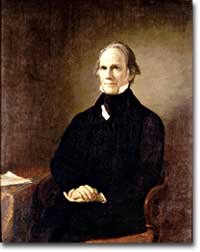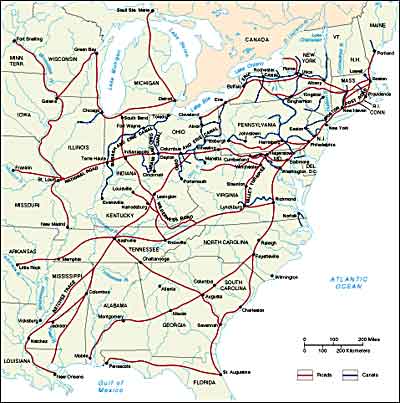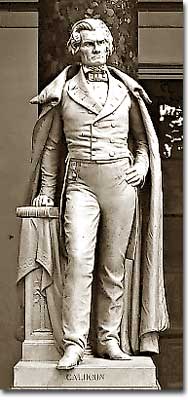What Nick name Was Andrew Jackson Given Andrew Jackson Ran for President Again in

24e. Jackson vs. Clay and Calhoun

Andrew Jackson viewed Henry Clay, the Dandy Compromiser, every bit opportunistic, aggressive, and untrustworthy.
Henry Clay was viewed by Jackson as politically untrustworthy, an opportunistic, ambitious and self-aggrandizing human. He believed that Dirt would compromise the essentials of American republican democracy to accelerate his ain self-serving objectives. Jackson besides adult a political rivalry with his Vice-President, John C. Calhoun. Throughout his term, Jackson waged political and personal war with these men, defeating Clay in the Presidential election of 1832 and leading Calhoun to resign equally Vice-President.
Jackson's personal animosity towards Clay seems to take originated in 1819, when Dirt denounced Jackson for his unauthorized invasion of Spanish W Florida in the previous twelvemonth. Dirt was as well instrumental in John Quincy Adams's winning the Presidency from Jackson in 1824, when neither man had a majority and the election was thrown into the House of Representatives. Adams' date of Clay as Secretary of State confirmed Jackson'south opinion that the Presidential ballot has been thrown to Adams every bit part of a corrupt and unprincipled deal.

Courtesy of AWL Online
Roads and canals were built to beyond the nation during the early on to mid-1800s. Dirt's "American Arrangement" would accept funded such improvements.
Clay was called The Swell Compromiser, and served in the Congress starting in 1806. He had a grand strategic vision chosen the American System. This was a federal regime initiative to foster national growth though protective tariffs, internal improvements and the Banking concern of the Us. Clay was unswerving in his back up for internal improvements, which primarily meant federally funded roads and canals. Jackson believed the American System to exist unconstitutional — could federal funds be used to build roads? He vetoed the Maysville Road Nib, Clay's attempt to fund internal improvements. His veto of the Depository financial institution Recharter Pecker drove the ii farther autonomously.

Calhoun and Jackson held split up views on many problems, including states' rights.
Jackson'southward personal animosity for Calhoun seems to have had its origin in the Washington "social scene" of the time. Jackson's feelings were inflamed by the Mrs. Calhoun's treatment of Peggy, wife of Jackson'due south Secretarial assistant of State of war, John Eaton. Mrs. Calhoun and other wives and daughters of several cabinet officers refused to attend social gatherings and state dinners to which Mrs. Eaton had been invited considering they considered her of a lower social station and gossiped about her private life. Jackson, reminded of how rudely his own wife Rachel was treated, defended Mrs. Eaton.

Many political issues separated Jackson from Calhoun, his Vice President. One was the issue of states rights. Hoping for sympathy from President Jackson, Calhoun and the other states-rights party members sought to trap Jackson into a pro-states-rights public pronouncement at a Jefferson birthday celebration in April 1832. Some of the guests gave toasts which sought to establish a connection betwixt a states-rights view of government and nullification. Finally, Jackson's turn to requite a toast came, and he rose and challenged those present, "Our Federal Union — Information technology must be preserved." Calhoun then rose and stated, "The Matrimony — side by side to our liberty, the most dear!" Jackson had humiliated Calhoun in public. The nullification crunch that would follow served as the final straw. Jackson proved that he was unafraid to stare down his enemies, no affair what position they might hold.
![]()
If you lot similar our content, delight share it on social media!

![]()
Source: https://www.ushistory.org/us/24e.asp
0 Response to "What Nick name Was Andrew Jackson Given Andrew Jackson Ran for President Again in"
Post a Comment